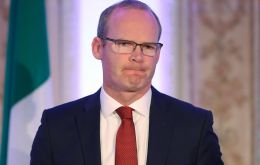MercoPress. South Atlantic News Agency
Economy
-
Friday, July 20th 2018 - 07:21 UTC
Argentina finances improving: half year primary deficit drops to 0.8% of GDP

Argentina posted a primary fiscal deficit of 105.8 billion pesos (US$3.7 billion), or 0.8% of gross domestic product (GDP) in the first half of 2018, government data showed on Thursday, down 26.7% from the same period last year.
-
Friday, July 20th 2018 - 05:13 UTC
British publishing industry warns Brexit could damage record breaking export business

The UK publishing industry has warned that Brexit could damage its record-breaking export business. The boss of the Publishers Association said any tariffs or other barriers to trade post-Brexit “could be a problem”.
-
Friday, July 20th 2018 - 04:18 UTC
Falklands' survey says air link and telecoms biggest barriers to business growth

The biggest barriers to business growth in the Falkland Islands are the air link to Chile and telecommunications bandwidth (speed and quality) according to the Falkland Islands Development Corporation Business Climate Survey. In the survey to which 106 businesses responded (a 42% response rate) 30.86% selected those options.
-
Thursday, July 19th 2018 - 08:16 UTC
England interested in hosting the football World Cup in 2030

The UK Government is open to discussions on a possible bid to host the football World Cup in 2030, Downing Street has said. Prime Minister Theresa May’s official spokesman said ministers would be “happy” to talk with football authorities about any proposal they might want to put forward to FIFA.
-
Thursday, July 19th 2018 - 08:03 UTC
UK inflation remained unchanged in June at 2.4%

The cost of fuel rose to its highest level in almost four years last month and held up the rate of inflation in the UK, according to the Office for National Statistics.
-
Thursday, July 19th 2018 - 07:50 UTC
Brazilian Real and Argentine Peso lose ground against the dollar

Latin American currencies fell against the dollar across the board on Wednesday as traders continued to focus on recent statements by key U.S. monetary policy makers.
-
Thursday, July 19th 2018 - 07:44 UTC
Macri offers optimistic forecast of Argentine economy, pledging growth will return next year

Argentina’s economy will return to growth in 2019, President Mauricio Macri said on Wednesday, following a year marked by higher-than-expected inflation and a run on the Peso currency that many economists anticipate will lead to a recession.
-
Thursday, July 19th 2018 - 07:07 UTC
Ireland frustrated with UK's Brexit shifting position and “confusion” signals

Ireland and the EU are very frustrated at the UK Government’s shifting positions on Brexit, the country’s deputy premier has said. In a special Brexit meeting taking place at Derrynane House in Co Kerry, Taoiseach Leo Varadkar and his ministers will thrash out Brexit plans at the ancestral home of Irish political leader Daniel O’Connell.
-
Thursday, July 19th 2018 - 04:37 UTC
Google fined 2.42bn Euros by the European Commission for abuse of power

Google has been fined 2.42bn Euros by the European Commission after it ruled the company had abused its power by promoting its own shopping comparison service at the top of search results. The amount is the regulator's largest penalty to date against a company accused of distorting the market.
-
Wednesday, July 18th 2018 - 09:06 UTC
European business lobby urges Brussels to accelerate trade talks with Mercosur

European companies are urging the European Union to accelerate trade negotiations with Mercosur bloc, in a sign of concern that the 20-year talks could once again fall dormant if they do not reach an accord this week.
